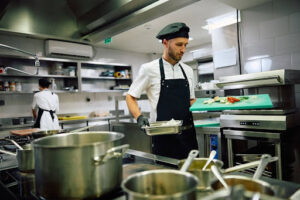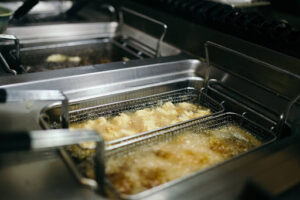We’ve all been there: you’re washing the dishes or cleaning up after a meal, and suddenly, you notice water standing still in your sink, refusing to drain. There’s nothing more frustrating than a clogged kitchen drain, especially when you’re in the middle of cooking or cleaning. So, what’s going on? Why is your kitchen sink not draining, and what can you do about it? Let’s explore this kitchen conundrum and find some practical solutions.
Common Causes of a Clogged Kitchen Drain
Are you currently standing with your hands on your hips, asking, “Why is my kitchen sink not draining?” If so, know that you’re not alone. A clogged kitchen sink can be the result of several factors, and understanding these can help you prevent future blockages:
Food Particles and Scraps
One of the most common causes of a clogged kitchen sink is food waste. Over time, food particles and scraps can accumulate in your sink drain, especially if you’re not using a garbage disposal or strainer. Potato peels, coffee grounds, and eggshells are frequent culprits that can cause significant buildup.
Grease and Oil Buildup
Pouring grease and oil down the drain might seem harmless, but these substances can solidify in the pipes, leading to stubborn clogs. Grease, combined with food particles, creates a perfect environment for blockages.
Soap Scum and Chemical Reactions
Regular use of soap in the kitchen can lead to soap scum buildup inside your pipes, reducing the diameter of the drain line. When combined with hot water and food waste, a chemical reaction can occur, causing a sticky residue that clogs the pipes.
Foreign Objects
If you’re wondering why your kitchen sink is not draining, the culprit could be something completely unexpected. Sometimes, foreign objects like utensils, sponges, or even toys can accidentally find their way into the sink drain, blocking the flow of water. These blockages can cause complete obstruction, leading to water backup.
Plumbing Issues
Issues like a faulty P-trap, tree roots invading your sewer line, or a damaged drain line can cause your sink to clog frequently. These problems require professional attention.
Simple Solutions to Try
There are a few methods you can try to unclog your kitchen sink:
- Boiling Water: Do you want to unclog your sink drain naturally? Sometimes, a simple fix like pouring boiling water down the drain can clear up soap scum or grease that’s causing the blockage. Be cautious with this method if you have PVC pipes, as the heat can loosen their joints.
- Plunger: A good old-fashioned plunger can often dislodge whatever is stuck in your clogged drain. Make sure to use a flat-bottomed plunger for sink drains (as opposed to the flanged kind for toilets).
- Baking Soda and Vinegar: This natural chemical reaction can help to break down clogs. Pour one cup of baking soda down the drain, followed by an equal amount of white vinegar. Cover the drain, wait for an hour, then flush with hot water.
When to Call in the Professionals for Help
If you’ve tried everything and your kitchen sink still isn’t draining, it might be time to call in the experts. Here’s when to seek professional help:
- Persistent Clogs: If your sink continues to clog despite your best efforts, it’s time to call a plumber. Persistent clogs may indicate a more severe issue in your drain line that requires professional drain cleaning services.
- Foul Odors: If you smell sewer gases emanating from your sink, it could mean a deeper problem in your plumbing system. A professional inspection can identify and fix the source of the smell.
- Slow Draining: A slowly draining kitchen sink is a sign of a partial blockage. A professional plumber can thoroughly clean the pipes to prevent a complete clog.
How to Prevent Future Clogs
Now that you know what can cause a kitchen sink drain to clog, you can be proactive to avoid issues in the future. For instance, by using a drain strainer, you can catch food scraps and foreign objects before they enter your drain. Make it a habit to empty the strainer regularly.
Instead of pouring grease down the drain, let it cool and dump it in the trash. This prevents grease buildup in your pipes. Running hot water after each use can also help flush away food particles and oils. This can help prevent buildup in the pipes.
It’s also worth mentioning that regular maintenance with professional drain cleaning services can prevent clogs before they happen. Scheduling routine check-ups with A&J Sewer Service can save you from unexpected blockages.
Why Choose A&J Sewer Service?
A&J Sewer Service is your trusted partner for all your drain and sewer cleaning needs. We understand the frustration of a clogged kitchen sink and are here to help you restore normalcy to your kitchen. Our skilled professionals use advanced techniques to thoroughly clean your drains.
If you need drain cleaning in Chicago, IL, or one of the surrounding areas, our team is ready to tackle the toughest clogs and restore your sink’s functionality. For sewer cleaning services, rest assured we also have the expertise to handle blockages that occur further down your plumbing system.
Don’t Let a Clogged Kitchen Sink Disrupt Your Life
A clogged kitchen drain can throw a wrench in your daily routine, but with the right approach, it doesn’t have to. By understanding what causes clogs and knowing how to respond, you can keep your plumbing in prime condition. And remember, for those times when DIY solutions just won’t cut it, A&J Sewer Service is just a call away.
Ready to get your kitchen sink back in working order? If you’re dealing with a clogged drain, don’t hesitate to reach out to us. Schedule your drain cleaning services today, and let us take the hassle out of your plumbing problems!



